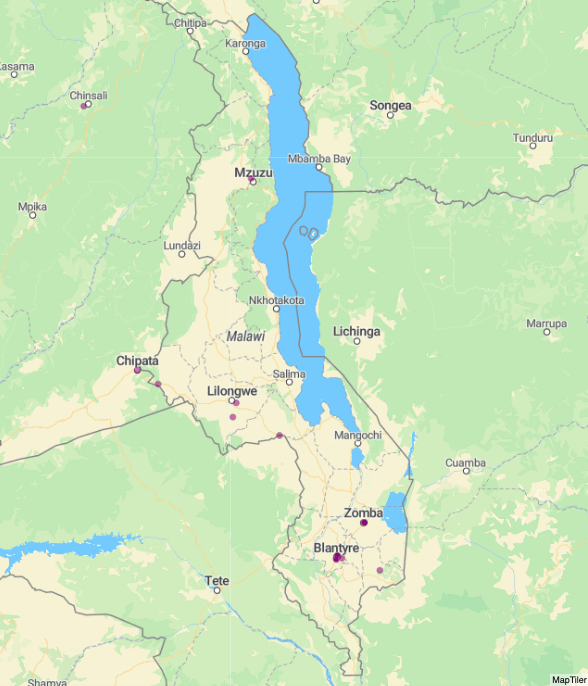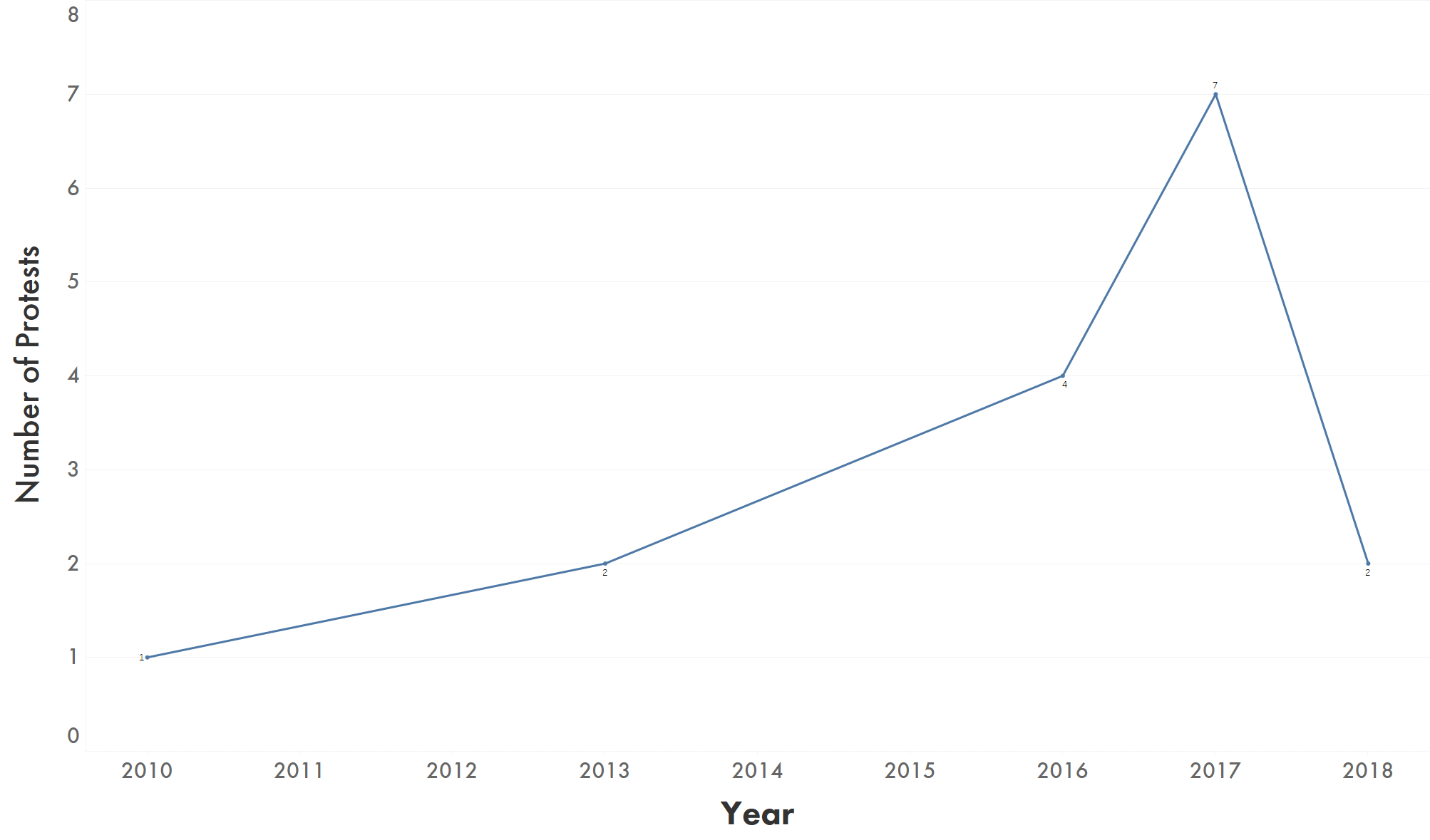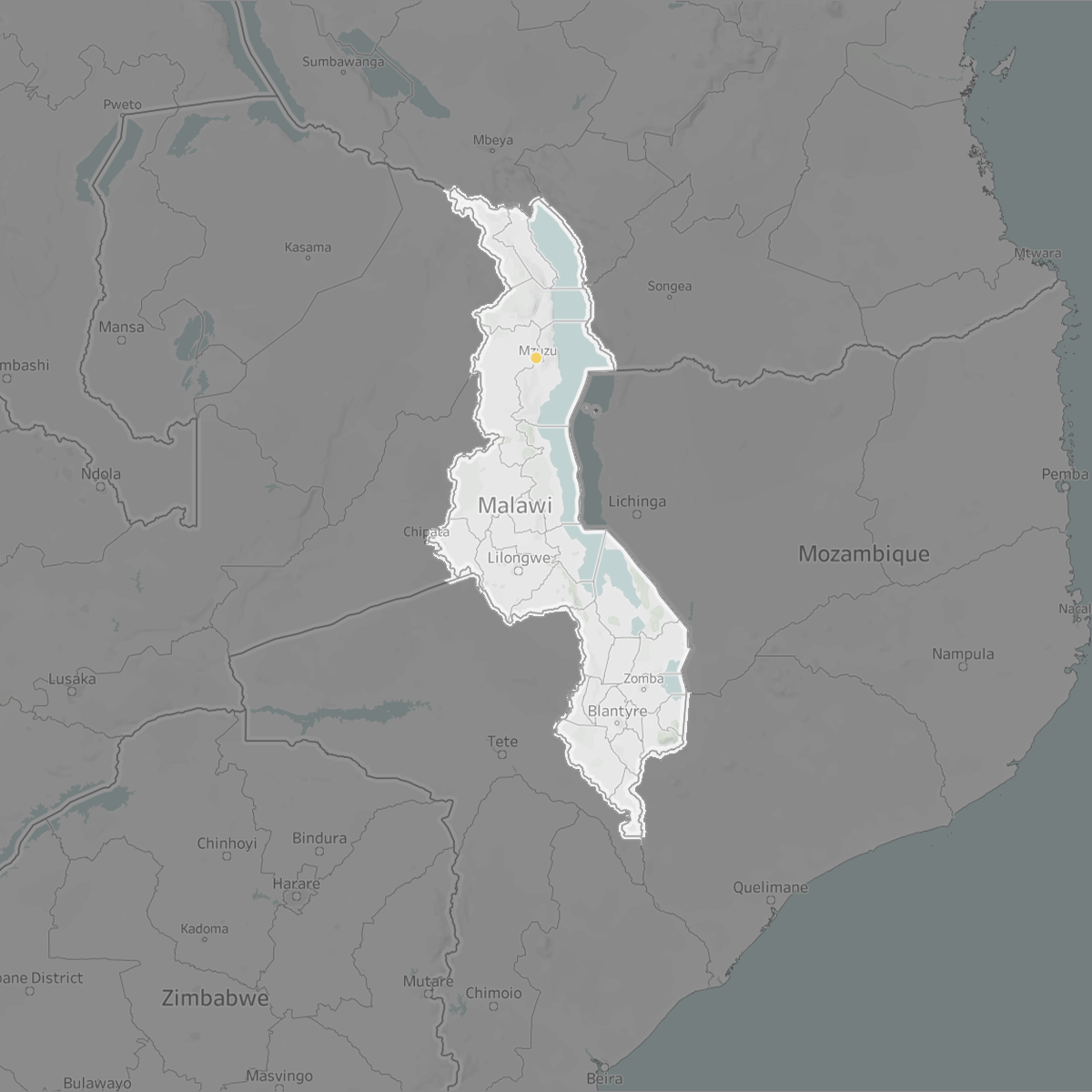Malawi
Malawi is a country of 14 million people. The capital city is Lilongwe and is home to about 890,000 people. The main geographic feature is the East African Rift Valley, which cuts the country from north to south. The Chewa are the dominant ethnic group, and their language Chichewa is prominently spoken throughout the country. The country is densely populated relative to other African countries, and their education system does include a version of an elite public school called the Kamuzu Academy, but most children are not eligible, and dropout rates remain high. Despite the density of the population, most of Malawi's population lives in rural areas, and nearly all of the arable land has been cultivated; crops such as maize, sorghum, and millet are prominent crops. Tobacco is the country's major cash crop, along with tea, sugar, and cotton. Malawi was colonized in 1891 by the British, and they achieved independence in 1962. Dr. Hastings Banda and his Malawi Congress Party (MCP) were the first to govern in independence. In 1970 Banda declared himself "president for life' spiraling into an increasingly oppressive rule, which included secret police and spies that he used to jail and torture dissidents. During the 1990s, many riots and strikes put pressure on Banda, and he conceded in 1993 to approve the return of multiparty democracy. He was defeated in the 1994 elections by Bakili Muluzi and his United Democratic Front (UDF) party. Muluzi won again in 1999. A Muluzi backed candidate, Bingu wa Mutharika, won in 2004 and also in 2009. In 2011 the country faced an economic crisis leading many to protest. Mutharika responded to those protests with violence and less political freedom. Still, he died suddenly in 2012 and was replaced by his vice-president Joyce Banda who has opted for a more democratic representation in her government.

DATA VISUALIZATIONS


PROTESTS
Malawi-January-2018
Blantyre, Central High School
Teachers staged sit-in to address disparities in their salaries and other benefits. They could not reach an agreement on the first day. (Primary Source)
Malawi-April-2017
Zomba, University of Malawi,Chancellor College
University student union organized a campus wide demonstration over lack of quality education. (Primary Source)
Malawi-June-2016
Zomba, University of Malawi,Chancellor College
26 Chancellor College students were arrested over "illegal demonstrations". Student's burnt tires in the streets and set fire to three hostels "where they also ambushed and assaulted a policeman and took away his cap." The students were protesting recent fee hikes by their university (Primary Source)
Malawi-February-2013
Blantyre, Chimwankhunda and Zingwangwa primary schools; Joyce Banda Foundation School buildings; Chilobwe Police Station
Nearly 100 "irate pupils" from two primary schools in Blantyre took to the streets to protest against their teachers' boycott of classes. Teachers have been boycotting for over a week. (Primary Source)
Malawi-November-2016
Blantyre, Blantyre International University
Students protest against the interest on their fees. Students got a court injunction regarding the legality of charging interest on their fees. (Primary Source)
Malawi-June-2016
Zomba, University of Malawi
Student leadership of University of Malawi Student's Union presents a petition to the Minister of Education, Science & Technology asking to have the recent school fees hike rescinded. (Primary Source)
Malawi-June-2017
Blantyre, Teachers Union of Malawi (TUM)
Primary school pupils blocked a main road in protest of authorities continued refusal to pay leave grants, which caused a nationwide strike by their teachers (over 70,000 teachers). 9 students were arrested. (Primary Source)
Malawi-December-2017
Luanar, Lilongwe University of Agriculture and Natural Resources,Bunda campu
Student protest lack of electricity. Property damage occurred during protest. School closed in response. (Primary Source)
Malawi-March-2013
Dezda, Dedza Secondary School
School was shut down following protests by students over poor diet and living conditions. (Primary Source)
Malawi-December-2016
Mchinji, Kholoni Community Day Secondary School
Students in the early hours "smashed" the school in response to the poor management of their school and the increase in fees. Student's threw stones into windows and offices desks, chairs, and doors were reported damaged. This incidence was reported as a riot. (Primary Source)
Malawi-November-2017
Mulanje, Mitawa 1 Primary School
Angry villagers vandalized and damaged the school in protest against head teacher and other teachers who were accused of practicing Satanism. (Primary Source)
Malawi-June-2017
Blantyre City; Ntcheu; Balaka,
Primary school students took to the streets to protest their teacher's continued strike over "delayed payment of leave grants and other outstanding grievances". Student blocked roads. 23 people were arrested, including 9 students. (Primary Source)
Malawi-June-2010
Mzuzu, Mzuzu University
On day 3 of a student sit in, military police take over campus. Gunshots reported and tear gas was used. 17 students were arrested for "rioting and vandalism" (Primary Source)
Malawi-January-2017
Zomba, University of Malawi,Chancellors College
The Paralegal Resource Centre (PARECE), which is a student organization at Chancellors College protest to fight vagrancy laws. (Primary Source)
Malawi-May-2018
Lilongwe, Don Bosco Youth Technical Institute
As part of "16 Days of Activism to End Violence Against Women" student activists organize arts performances. 600 people were in attendance of the performances. (Primary Source)
Malawi-December-2017
Blantyre, Blantyre
Students stage protest to protest their teacher's nationwide strike. Student's calling for government to pay their what they are asking for so the students can return to school. Students blocked roads, set fires. Tear gas was used to disperse protesters. (Primary Source)